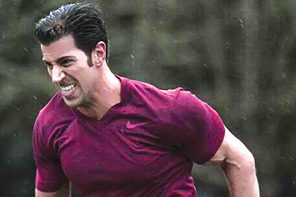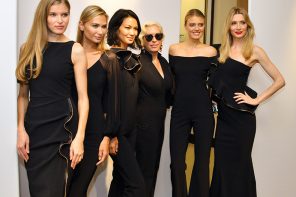Few people have had the kind of career that the gracious Melissa Manchester has had.
From her early days singing at the Continental Baths in New York as one-third of Bette Midler’s backup vocal trio, The Harlettes, to a successful career as a singer/songwriter with hits ranging from “Midnight Blue” and “Don’t Cry Out Loud” to “Through the Eyes of Love” and “You Should Hear How She Talks About You” to acting in film, TV and onstage, Manchester is a powerhouse. Her latest project is “The Fellas” (Long Run Records), a fabulous and heartfelt tribute to celebrated crooners, including Mel Tormé, Nat King Cole, Frank Sinatra and Dean Martin.

Photograph by Jennifer O. Hill.
What can you tell me about what would seem to be the daunting process of selecting songs by Nat King Cole, Dean Martin, Tony Bennett, Frank Sinatra, Mel Tormé and others to record for “The Fellas”?
“It was a bit daunting. Those guys lived in an age where their golden voices were catered to by songwriters of equal brilliance. I wanted to choose a song that would best capture the essence of them. They all had so many songs to choose from. I suppose it’s my subjective point of view, but that made it a delightful challenge. I think I did well.”
I’m so glad you mentioned the songwriters. Like your 1989 album, “Tribute,” your new album pays homage to the singers who inspired you as a performer. As a songwriter, can you also say something about the influence of songwriters such as Jimmy Van Heusen, Sammy Cahn, Irving Berlin, Cole Porter, Michel Legrand and Marilyn and Alan Bergman?
“’The Fellas’ is the completion of an idea that started in 1989 with ‘Tribute,’ which was obviously for the women that meant so much to me. These artists predated the wave of singer/songwriters that showed up in the mid-’70s. In those days, these singers with these incredible voices were fortunate enough to have songwriters write for their voices. In my opinion, the songwriters were giants in their own right. That was also before the American popular song was rhythm-driven. They were still melody-driven. When they’re melody-driven, you have a chance to develop very long melody lines, which support long, developed lyrical ideas, giving the singer a lot to sing. If you have the strength and stamina of your voice to do that, then these songs are just magnificent to take charge of.”
One of the treats of the album is hearing you singing with Barry Manilow on “For Me and My Gal.” How did this superb idea come about?
“Barry is an old friend. I reached out to him to create the only duet with me on the album. He agreed with me right away. He suggested a recreation of Gene Kelly and Judy Garland’s famous duet from the film of the same name. We basically stuck to Roger Edens’ original vocal arrangement. It was great. Peter Hume did the orchestration.
“Barry came in to Citrus College (in Glendora, California, where she teaches) to look around and his mind was blown because musical education really saved his life. He so appreciated that a community college could have such a far and important reach with these kids. He thought that the state-of-the-art studio was fantastic. He loved the fact that the kids were making all kinds of musical noise in the hallway. It was wonderful. “
GS: Of “the fellas” to whom you pay tribute on the album, Johnny Mathis and Tony Bennett are the lone survivors. Do you know if they are aware of this musical project and, if so, what do they think of it?
“I reached out to both of them to see if they were interested in perhaps doing a duet. Johnny was making his own album. I never heard back from Tony Bennett’s camp, so I have no idea. Johnny has recorded a couple of my songs and I even got to perform with him on a PBS special. When the answer that you want doesn’t come back, you have to get peaceful and say, whether they know it or not, they are loved from afar and are being saluted. That’s all that’s important.”
In addition to “The Fellas,” the double disc set “Through The Eyes of Love: The Complete Arista 7″ singles set has just been released. Do you have a favorite and least favorite Arista single?
“I don’t even remember all of the singles, so I can’t tell you what is my most or least favorite. The one that is most touching to me is ‘Midnight Blue,’ because it was my first single. What’s interesting about a lot of those songs is that they’re reflective of those musical times. They sound like the ’70s and ’80s. It’s a fantastic gift to have that collection. They’re all remastered so they sound good. I was consulted on the liner notes, and it was lovely that both (CDs) came out on the same day.’
Finally, as one of Bette Midler’s former Harlettes, did you have a chance to see her do “Hello, Dolly!”?
“I haven’t seen her do “Hello, Dolly!” but I congratulated her right after she won the Tony. I’m so happy for her and proud of her.”
Melissa Manchester performs Feb. 17 in the Hillwood Recital Hall at Tilles Center for the Performing Arts in Greenvale, New York. For more, visit tillescenter.org.



